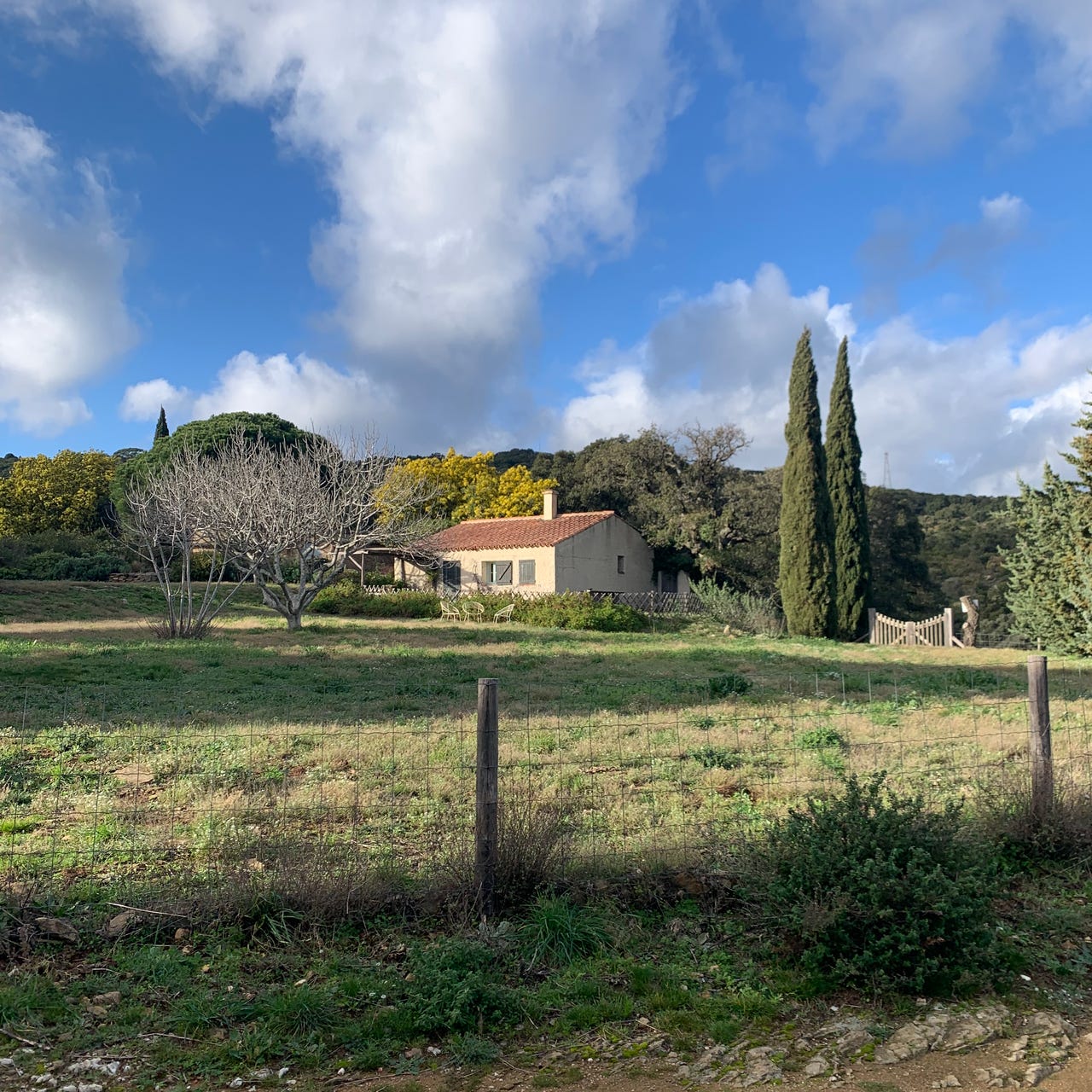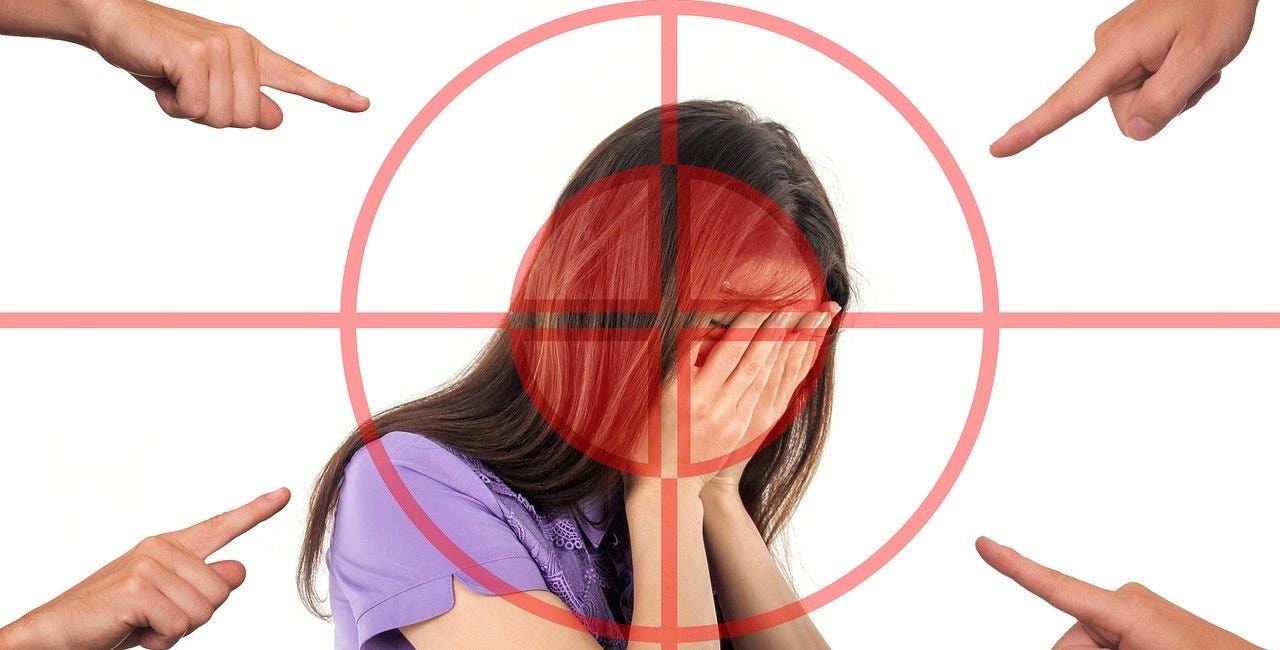Two thoughts on happiness
Actually, make that three
First, before a chunk of subscribers sign off in disgust over the outrageous and declassè thoughts in this post, an announcement.
P (partner to me, human-mostly-in-charge to Youna) has a Substack that you might hop onto.
It's about finding where you belong and the thoughts and adventures that happen along the way. She and Youna are living in a van right now, but will eventually be walking about 2,000km to a home she has found. Makes sense, if you go look.
A brief spat with the reader of another Substack1 reminds me of how reactive (rather than thoughtful) we instantly become when someone who doesn't matter one jot to us disagrees with our perspective.
This can only arise from a feeling that you are your thoughts, beliefs, principles etc. So criticism of your thoughts is an attack on you. Or, dismissal of your idea about something is a diminishing of you.
Noticing this has been instrumental in helping to give exponentially fewer fucks about what most people think of me and the ideas I hold.
It seems healthier because - in turn - it also often helps me to see past opinions that I don't agree with and instead treasure the essence of someone as a person.
An early attempt to think about this suggested that all you really are is how you go about being in the world and what you do in it. The rest is persona and posture.
Belief as identity
It was probably 1971 and me and my contemporaries were 9 or 10. I said: "I don't believe in decimalisation" and they all objected by saying that decimalisation was actually happening. Two things about this are funny. One is that I was trying to be the copied and pasted version of my parents that they wanted. They were quite conservative in their fondness …
None of this would really matter if we kept our mistaken views of what constitutes the self private. But we don't, because identity feels too important to many of us.
Then it stops broader problems from being addressed, commonly by circling the wagons together.
If you're an estate/real estate agent and you hear that people think a lot of operators really suck in that area it would be weird to take it personally.
But if you're in a more 'rarified' environment in which you expect a recognition of status it probably feels different. Or if your identity has been set up as a kind of sanctified thing (as the anglophone left has worked so hard to do with transgenderism, non-caucasian skin, indigenous heritage and culture).
When I was salaried in media I never took it to heart when people criticised journalists as a class. Because it's self-evident that any class of something has its share of bad things. Plus, it's stupid to lump any class together as all positive or all negative.
It was seeing how ideological capture of our brains works that made it easier to shed that clothing.
Remembering those Twitter accounts that posted nothing but examples of criminal migrants assaulting people or stealing stuff and the polar opposite ones that blathered about 'the myth of the good and bad migrant' (spoiler - because they are all, by definition, good) and how ideology seems to demand the flattening of all things into simple binaries.
So it was, last week, when I made the neutral observation that the infamous 'masturbation paper' (an example of the supposedly scholarly field known as 'autoethnography', but which I prefer to think of as blogging for letters after your name) raised no concerns until people from outside the field noticed it.
I was echoing what the Times Educational Supplement had said about the problems that episode had revealed.
But my interlocutor shot back - following the briefest possible visit to the Rarely Certain page - to declare the newsletter to be obviously written by someone who spends 'too much time online'.
The Substack equivalent to angrily going through someone's old tweets.
I expended little energy in pondering what my reading or posting habits have to do with the failings of a worthless piece of supposed scholarship, because it's irrelevant.
What was interesting was how this person presumably felt that disagreement with their point was an attack on them, warranting a counter-attack on the person who was disagreeing with them.
The speed with which an escalation like that occurs is always a strong clue that something other than the actual disputed question is in play.
There's no evidence for this, because I withdrew without engaging further, but I'm guessing my interlocutor was connected in some way with the class of people broadly known as the academe.
No good can come of this instinct to circle the wagons instead of participating in good faith conversation.
The remarkable story of the 'black African metallurgists' who supposedly had a groundbreaking innovation stolen by a white colonialist slave owner serves as the perfect illustration of this problem.
The scholarship there is really fictional storytelling. Allegorical rather than factual, if you want to be charitable. Bullshit, if you prefer to be honest. Filled with unevidenced and demonstrably false assertions and sprinkled with factual errors. But when this was pointed out, around went the wagons and the critics departed.
Here's a summary of that story, from some other scholars who are concerned about the quality of some historical research, after this example garnered its author widespread and unquestioning mainstream media coverage - Dr Bulstrode on Black Metallurgists and the Industrial Revolution.
Resistance to addressing obvious problems in a system seems to stem from identifying yourself with the system, rather than as an individual who happens to be in the system.
Here's where a tiny personal theory of happiness comes in.
If your happiness is at all predicated on an identity that relies on recognition, rather than being a discrete entity, you're at the mercy of external factors, like the reputation of an organisation you're connected with.
Having prior long and bitter experience of allowing my own wellbeing to be predicated on the whims and caprices of others (usually women, if I'm honest), this feels important. To be self-contained. To be happy in your dealings and in what you do, rather than what you identify yourself as.
It's why I no longer identify as anything except a complex cluster of particles with a layer of subjective consciousness that goes around doing this and that, noticing thoughts about this and that, liking and disliking this and that.
The only bit that matters to anyone else is what this cluster of biochemicals does and doesn't do.
Seeing yourself and other people in this way can be liberating.
Specifically, it can liberate you from the relentless moral calibration of the parts of people that are none of your business.
I read something this week, by a youngish French person, arguing that a white person who isn't sexually attracted to black people is necessarily racist, because there is no good reason for being that way. But a black person who isn't attracted to white people has political reason for their taste and is therefore not racist.
Not fancying someone with the body type, style and personality that presses your buttons but who has a different skin tone seems to come from somewhere.
Brace for this.
It might be political or it might be racist and that's fine.
Maybe I’m racist. It’s OK.
Reflecting on how there has only ever been one black woman I ever felt sexually attracted to I concluded that I don't care if this makes me racist. Maybe 'Nora' - who sadly rebuffed my advances - was just an aberration in my racism-tinged psyche.
Time was when I would have indulged in much throat-clearing about how I'm not racist. But now I no longer care. Maybe I am. Think what you like about this.
All I care about is that this jumble of conscious biochemicals doesn't go around disparaging black people or interacting negatively with them.
You can be as homophobic as you like and unless you go around being a dick to gay people I truly don't care what disgusts or frightens you.
You do you. Just don't be a prick in this world.
Hate all men, if you want. Or all women. It's your prerogative. Your business only. Unless I see you being a dick to men or women, by virtue of their biological makeup, this is fine.
The contents of your mind are of no consequence to me.
That this feels quite a radical idea speaks to how determined the effort to mould us has become. How used we’ve become to policing ourselves and others.
And also how gnostic the supposedly God-free world of social justice has become, with its focus on the invisible contents of the psyche.
Relentless handwaving about the need to counter 'Hate' - rather than bad and illegal behaviour - sometimes irritates me to the point of despair.
What I like, dislike, love or hate, is none of your business. David McGrogan explores this ludicrous moral hand-wringing here in a way that chimes.
[In parenthesis, McGrogan has been an interesting discovery. A British conservative intellectual with an actual intellect. He’s shedding light on a lot of intuitions I had, but lacked the capacity to really develop into anything worth sharing myself.]
The fact that I can see black women who are strikingly beautiful yet not sexually desirable to me is of no consequence in this world.
That ultimately empty phrases such as 'the personal is political' have had such great rhetorical heft says nothing of their truth value. Just that they sound good to enough people, who will then repeat them.
The personal is not political. It’s just a line. Some words. The clue is in the word personal.
Here are some more. I just made them up.
The private is the public.
The music is the dance.
Just words. Which can be strung together and sound profound, even when they are not.
Sometimes I just hate words. They are not to be trusted. We fall for certain combinations just because of their rhetorical heft. This is why intellectuals and dictators especially like words and use them to advance their interests. We are all suckers for words.
Racist is a word that has gained massive rhetorical heft, while the actual arc of western life renders it less meaningful by the year.
So, to the 2nd tiny theory; that no longer caring what others think of what I think has contributed significantly to a more secure sense of self.
I almost never fancy black or asian women and I don't care why. It's just how it is. Why doesn't matter. it's no one's business. It isn't remotely interesting to me.
If I had bigger balls I'd tweet that and enjoy the resulting meltdown.
The third thought about happiness is much less controversial than extolling the virtues of accepting that you're possibly racist - or any other of the multitudinous sins of thought in western liberal culture - and not caring.
It came to me during a walk that I was inexplicably enjoying last week. And it came again, eating a curry that was inexplicably disappointing.
The walk was awful. My knees doubtless need surgery to make sliding around in mud less uncomfortable. It was raining steadily and my Paramo jacket needs re-proofing. The environs weren't particularly interesting. And I felt great. Uplifted and glad to be exactly where I was, doing what I was doing.
The curry was awful. Bland and over-reduced. It was a korma that tasted about as interesting as a potato.
The key was that I'd only taken the walk for fitness reasons. It was an act of obligation, when all I really wanted was to stay home and tinker with research or reading, maybe in front of a nice fire.
I expected a pleasure quotient (on the proverbial scale of 1 - 10) of about 3 or 4 from this walk. It was actually a 5, when I did it.
5 out of 10 is a crap score. So what's going on with feeling so good on this walk?
Just that it was better than predicted.
The curry was projected around an 8 or 9. It was the first time I'd attempted a truly authentic korma, from scratch. I was excited about it. Really in the mood for patient and careful cooking.
The eating experience was maybe 7. It was Ohhhh Kaaay ish. Not that bad.
So why be so discombobulated about it?
It was worse than predicted. That's all.
There's a much more long-winded version of this 'insight' here.
But, long story short, subjectively great or bad feels are a function of forecasting error. They are unmoored from actual experience. It's all about overshooting or undershooting on expectations.
The obvious trick here is not to predict at all. But I just can't seem to manage that.
That's a big part of what being in the moment is supposed to be about. Neither leaning forward nor back.
Despite the meditation app now informing me that I've spent nearly 11,000 minutes in formal practice sessions, neither anticipating nor reflecting back remains a mostly elusive skill.
But it's satisfying to sometimes notice how it's supposed to work.
As an objective matter of fact it was a shit walk and an OK curry. But my experience of each was entirely determined beforehand.
Try noticing if this happens in your world too.
Next week, whether or not I stayed in the Facebook group that discusses the magnificent Culture series of SciFi novels. Because, you should already be guessing, it’s not the friendliest place.
I’m not sharing which post, so that no one feels inclined to join in with the stupid shenanigans.







"What I like, dislike, love or hate, is none of your business." Thank you for your whole article behind that sentence, articulating just where I have been arriving in my own thinking. I've realised that one answer to "You can't say that anymore" is "According to who?" People are earnestly creating a noose to strangle themselves with.
If that helps, I've just come back from a week-long Italian holiday where I was expecting to eat like a pig and enjoy it all. I landed with a stinking cold that hasn't left me yet, and I can't smell or taste a single thing even if it lands on my nose and starts chewing on it. As something that started out as a joke, I asked people to describe to me the taste of what we were eating (a bit like you describe a view to a blind person). Oddly, I very much enjoyed seeing people engage with the game to help me experience a pleasure I was unable to have first hand. I had different expectations of this holiday, but all it took was to allow a little playfulness in the process and be undeterred in my intention to enjoy the food. There are very few objectively nasty things life sets aside for us. Largely, perception rules.